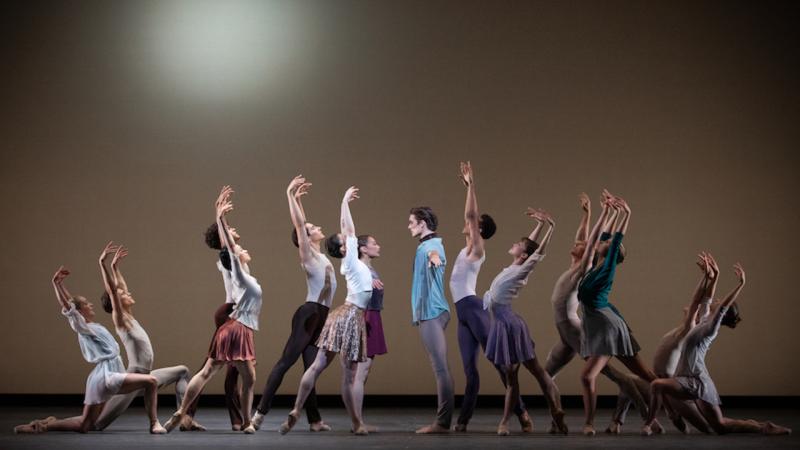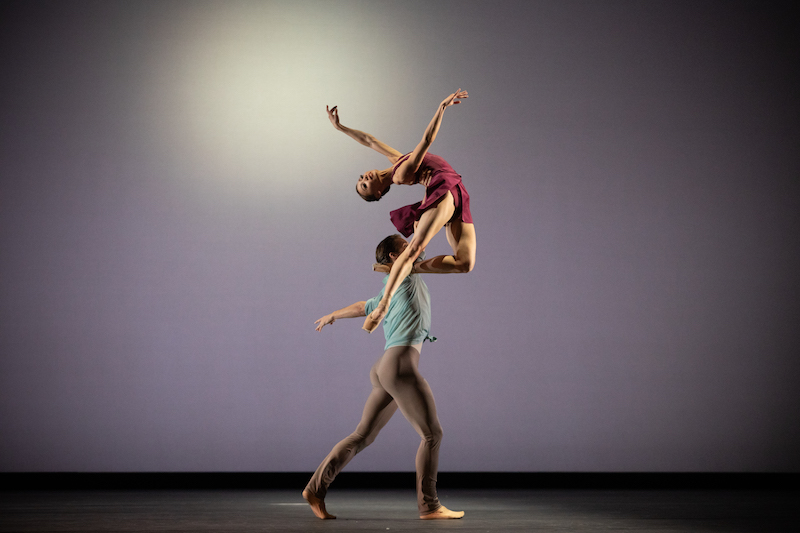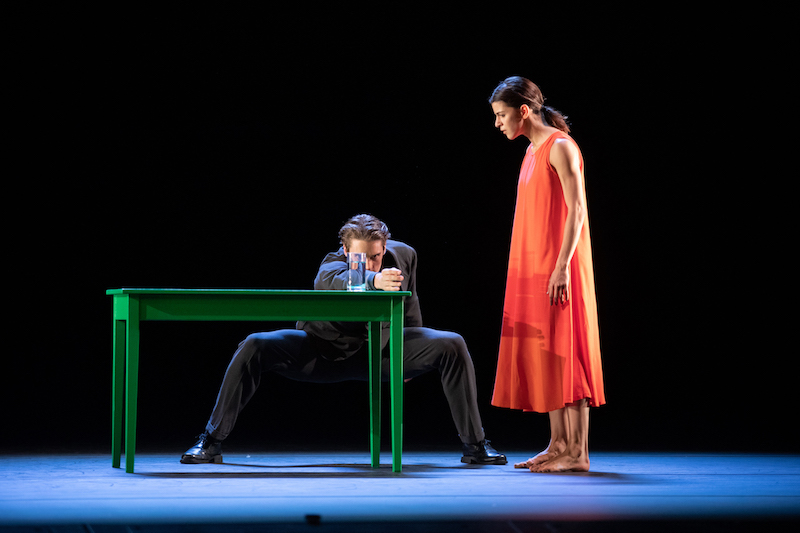Beauty Mixed Programme, Royal Ballet review - no dancers? No problem | reviews, news & interviews
Beauty Mixed Programme, Royal Ballet review - no dancers? No problem
Beauty Mixed Programme, Royal Ballet review - no dancers? No problem
The company's 90th anniversary celebration triumphs over setbacks

Crisis-management has always been part of a choreographer’s skillset, but staging a new ballet with two large alternating casts has rarely been fraught with so much risk. It was one hell of a week for Valentino Zucchetti, first soloist at the Royal Ballet and creator of Anemoi, the 20-minute work that opens the final programme in the company’s 90th birthday season.

What’s refreshing about Zucchetti’s work – on the evidence so far – is that he’s unusually determined to resist the pressure to innovate for innovation’s sake. In terms of steps, the current lexicon suits him fine. What interests him is pattern and formulation, and he rarely shows the same idea twice. He’s good on visual metaphor too, and once you know that the Anemoi were the four winds of Greek mythology, each associated with a season and its weather (represented here by four principal dancers), it’s easy to see the corps de ballet as their wind-blown effects: scudding clouds, sea spray and fields of waving corn. Leticia Dias is sensual and flirty as the summer wind, Mariko Sasaki keen-edged as the chilly one, cutting a swathe through the upper air in startling lifts (pictured above). Zucchetti is a choreographer unafraid of beauty, which takes guts these days. His choice of music – a movement from Rachmaninov’s Symphony No.2, its big tunes delivered swooningly by a reduced ROH Orchestra – makes that doubly clear.
The shocking close involves a stage hand with a mop and bucket
The miscellany of shorter pieces that follows brings a counter-balance. Morgen, a new duet by Wayne McGregor set to the Richard Strauss song of that title, achieves intimacy despite its modernism, and the fact that the eventually enraptured pair seem barely to notice one another for half the piece. César Corrales is preoccupied by the snaky possibilities of his upper body, while Francesca Hayward strikes lonely balances some distance away.
Mats Ek’s woman with water (declaring its nonconformity by refusing to capitalise) is superficially simpler and starker but packs a bigger punch. It’s good to see Mayara Magri, newly promoted to principal, stretched in this direction. She’s a strongly built dancer, no slip of a thing, and Ek’s work demands strong women. Clad in an orange tent dress (men: beware), Magri contemplates an empty glass set on a bright green table. The colour pop would be enough in itself, but it also points to a milestone of modern dance, The Green Table, a work made in 1932 by the German choreographer Kurt Jooss addressing the futility of peace negotiations.
 Militantly unpretty, the movement vocabulary is pure Ek with its squats and lunges, head butts and flexed heels. When a man (Lukas Bjõrneboe Brëndsrõd, pictured above with Magri) abruptly appears with a jug and fills the glass with water, Magri gulps it down in one. He half-fills it several times more, between bouts of alpha-male posturing on and around the table. Is the glass half-full or half-empty? Is the guy useful only as a provider? That’s the woman’s dilemma. The shocking close, involving a stage hand with a mop and bucket, doesn’t bode well for her.
Militantly unpretty, the movement vocabulary is pure Ek with its squats and lunges, head butts and flexed heels. When a man (Lukas Bjõrneboe Brëndsrõd, pictured above with Magri) abruptly appears with a jug and fills the glass with water, Magri gulps it down in one. He half-fills it several times more, between bouts of alpha-male posturing on and around the table. Is the glass half-full or half-empty? Is the guy useful only as a provider? That’s the woman’s dilemma. The shocking close, involving a stage hand with a mop and bucket, doesn’t bode well for her.
The other duets on the bill – all seen before on the Covent Garden stage – do a nice job of covering the company’s main bases. Ashton, MacMillan, Wheeldon. But no look-back could be complete without a nod to The Sleeping Beauty, and Ninette de Valois’ production of it that forged this company’s identity in the immediate post-War years. We’re treated to the full third act, culminating in the grandest of grand pas de deux, with both Marianela Nuñez and Vadim Muntagirov on-form and on fire. Never mind that Tchaikovsky’s score has been scaled back for a Covid-spaced orchestra, the trombone covering four horn parts at the music’s climax. Professionalism and verve carry the day.
rating
Explore topics
Share this article
Add comment
The future of Arts Journalism
You can stop theartsdesk.com closing!
We urgently need financing to survive. Our fundraising drive has thus far raised £49,000 but we need to reach £100,000 or we will be forced to close. Please contribute here: https://gofund.me/c3f6033d
And if you can forward this information to anyone who might assist, we’d be grateful.

Subscribe to theartsdesk.com
Thank you for continuing to read our work on theartsdesk.com. For unlimited access to every article in its entirety, including our archive of more than 15,000 pieces, we're asking for £5 per month or £40 per year. We feel it's a very good deal, and hope you do too.
To take a subscription now simply click here.
And if you're looking for that extra gift for a friend or family member, why not treat them to a theartsdesk.com gift subscription?
more Dance
 'We are bowled over!' Thank you for your messages of love and support
Much-appreciated words of commendation from readers and the cultural community
'We are bowled over!' Thank you for your messages of love and support
Much-appreciated words of commendation from readers and the cultural community
 Peaky Blinders: The Redemption of Thomas Shelby, Rambert, Sadler's Wells review - exciting dancing, if you can see it
Six TV series reduced to 100 minutes' dance time doesn't quite compute
Peaky Blinders: The Redemption of Thomas Shelby, Rambert, Sadler's Wells review - exciting dancing, if you can see it
Six TV series reduced to 100 minutes' dance time doesn't quite compute
 Giselle, National Ballet of Japan review - return of a classic, refreshed and impeccably danced
First visit by Miyako Yoshida's company leaves you wanting more
Giselle, National Ballet of Japan review - return of a classic, refreshed and impeccably danced
First visit by Miyako Yoshida's company leaves you wanting more
 Quadrophenia, Sadler's Wells review - missed opportunity to give new stage life to a Who classic
The brilliant cast need a tighter score and a stronger narrative
Quadrophenia, Sadler's Wells review - missed opportunity to give new stage life to a Who classic
The brilliant cast need a tighter score and a stronger narrative
 The Midnight Bell, Sadler's Wells review - a first reprise for one of Matthew Bourne's most compelling shows to date
The after-hours lives of the sad and lonely are drawn with compassion, originality and skill
The Midnight Bell, Sadler's Wells review - a first reprise for one of Matthew Bourne's most compelling shows to date
The after-hours lives of the sad and lonely are drawn with compassion, originality and skill
 Ballet to Broadway: Wheeldon Works, Royal Ballet review - the impressive range and reach of Christopher Wheeldon's craft
The title says it: as dancemaker, as creative magnet, the man clearly works his socks off
Ballet to Broadway: Wheeldon Works, Royal Ballet review - the impressive range and reach of Christopher Wheeldon's craft
The title says it: as dancemaker, as creative magnet, the man clearly works his socks off
 The Forsythe Programme, English National Ballet review - brains, beauty and bravura
Once again the veteran choreographer and maverick William Forsythe raises ENB's game
The Forsythe Programme, English National Ballet review - brains, beauty and bravura
Once again the veteran choreographer and maverick William Forsythe raises ENB's game
 Sad Book, Hackney Empire review - What we feel, what we show, and the many ways we deal with sadness
A book about navigating grief feeds into unusual and compelling dance theatre
Sad Book, Hackney Empire review - What we feel, what we show, and the many ways we deal with sadness
A book about navigating grief feeds into unusual and compelling dance theatre
 Balanchine: Three Signature Works, Royal Ballet review - exuberant, joyful, exhilarating
A triumphant triple bill
Balanchine: Three Signature Works, Royal Ballet review - exuberant, joyful, exhilarating
A triumphant triple bill
 Romeo and Juliet, Royal Ballet review - Shakespeare without the words, with music to die for
Kenneth MacMillan's first and best-loved masterpiece turns 60
Romeo and Juliet, Royal Ballet review - Shakespeare without the words, with music to die for
Kenneth MacMillan's first and best-loved masterpiece turns 60
 Help to give theartsdesk a future!
Support our GoFundMe appeal
Help to give theartsdesk a future!
Support our GoFundMe appeal

Comments
“Morgen, a new duet by Wayne
Mea culpa. Thankyou Simon.
Mea culpa. Thankyou Simon. Glad to know someone's awake. I shall correct the text.
Morgen is not written by